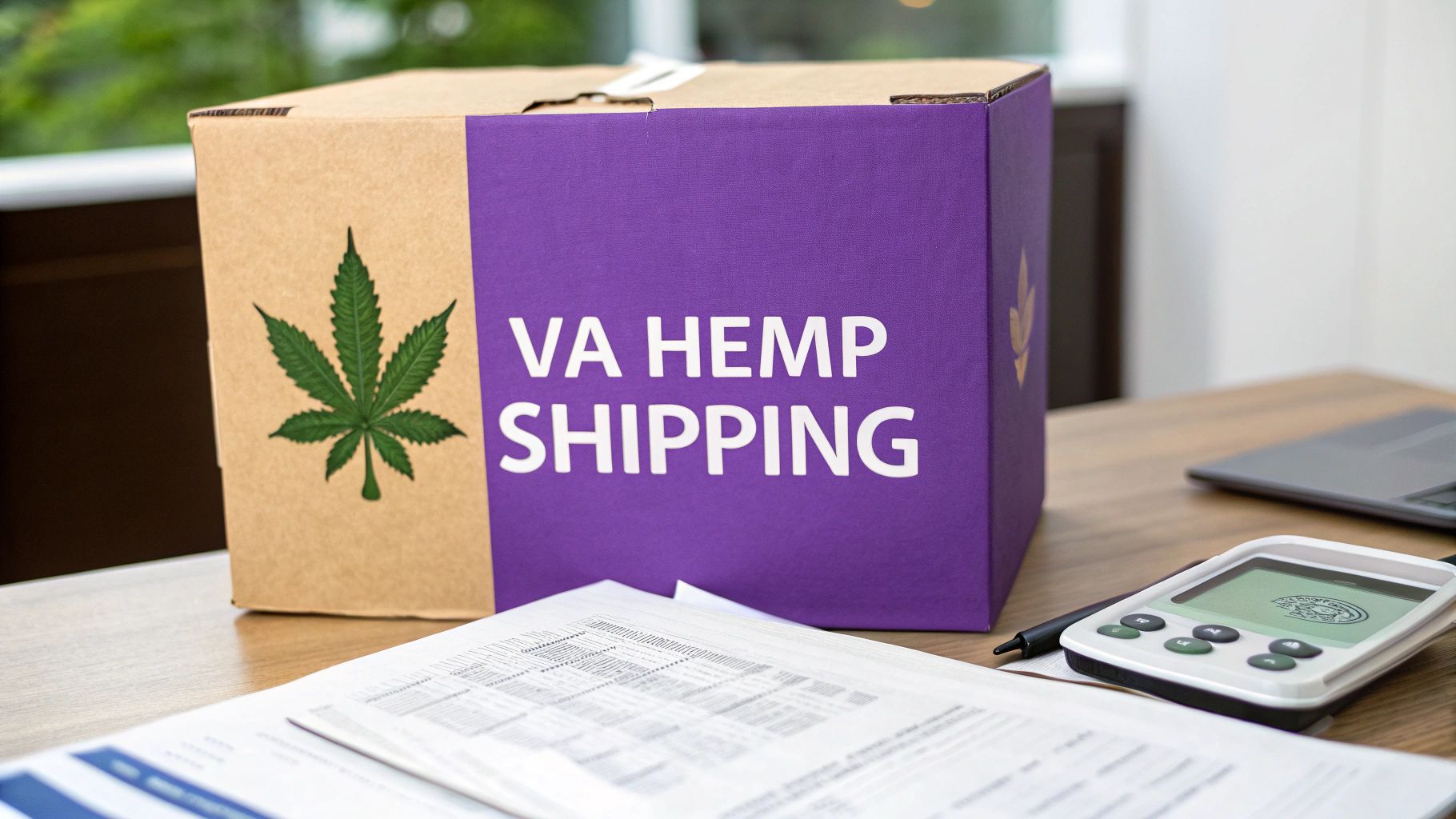
CBD/Hemp/THCA Shipping Laws Virginia: Your Quick Guide
Learn all about CBD/Hemp/THCA Shipping Laws Virginia. Stay compliant and ship legally with our essential guide to Virginia's regulations.
Cody Y.
Updated on Oct 21, 2025
Yes, you can legally ship CBD and certain hemp products to Virginia, but it's a minefield. While the 2018 Farm Bill opened the door for hemp federally, Virginia slammed it partially shut with its own strict laws, making plenty of common products illegal the moment they cross state lines.
Navigating Virginia's Unique Hemp Shipping Laws
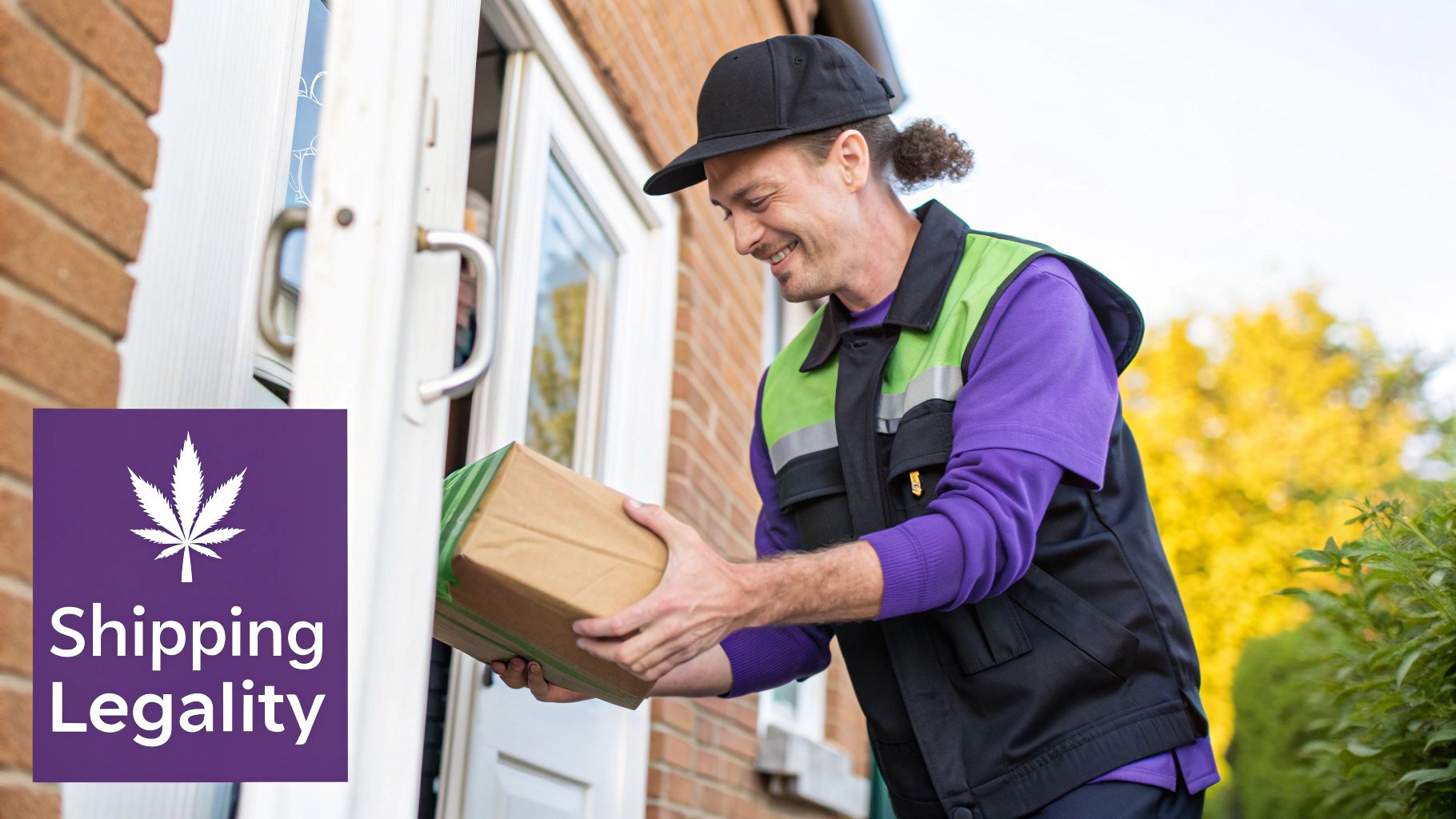
To ship hemp products into Virginia without getting into trouble, you have to forget what you know about federal law. Think of the Farm Bill as the bare minimum national standard. Virginia has built a much taller, stricter fence on top of it.
This clash is where almost everyone gets tripped up. A product that’s perfectly legal and flying off the shelves in another state can become illicit contraband in Virginia if it doesn’t meet the Commonwealth's specific rules.
The Core of Virginia's Regulations
To stay compliant, you absolutely have to understand three key rules that define Virginia's unique approach. These aren't suggestions—they're aggressively enforced, and ignoring them is a surefire way to face penalties.
- The "Total THC" Standard: Forget just looking at Delta-9 THC. Virginia law demands you calculate Total THC, which combines Delta-9 THC and its acidic precursor, THCA. This is a game-changer, especially for products like high-THCA hemp flower that are compliant under the federal definition.
- A Tiny 2mg Cap: For most products, Virginia imposes an incredibly strict cap of just 2 milligrams of Total THC per package. That's not per serving—it's per package. This rule alone makes many standard edibles, like a common 10mg gummy, instantly illegal.
- The 25:1 CBD to THC Ratio Exception: There's one way around that tight 2mg limit. A product can contain more than 2mg of Total THC only if it maintains a CBD-to-THC ratio of at least 25-to-1. So, for every 1mg of THC, there must be at least 25mg of CBD.
For a clearer picture, here’s a quick breakdown of how Virginia's rules stack up against the federal guidelines.
Virginia Hemp Product Requirements at a Glance
This table offers a quick summary of the key legal limits you need to know before selling or shipping hemp-derived products in Virginia.
| Regulatory Requirement | Virginia State Limit | Federal Guideline (Farm Bill) |
|---|---|---|
| THC Metric Used | Total THC (Delta-9 THC + THCA) | Delta-9 THC only |
| THC Concentration | 0.3% Total THC on a dry-weight basis | 0.3% Delta-9 THC on a dry-weight basis |
| THC Per Package | 2 milligrams Total THC (unless ratio met) | No federal per-package limit |
| CBD:THC Ratio | 25:1 (required to exceed 2mg THC cap) | No federal ratio requirement |
As you can see, Virginia’s requirements for Total THC, the per-package cap, and the mandatory ratio create a much more restrictive environment than the federal law alone.
Enforcement Is Not a Suggestion
Make no mistake: Virginia isn't playing around. The Virginia Department of Agriculture and Consumer Services (VDACS) launched a major crackdown in July 2023. By early 2025, they had inspected over 900 stores, and a staggering 80% of them were hit with civil penalties for failing to meet the state's THC limits.
This aggressive enforcement shows just how critical it is to understand every detail of Virginia’s laws before you even think about shipping. To get a better handle on the legal nuances driving these compliance issues, it’s worth exploring the critical shipping law differences between hemp and marijuana products.
The Federal Farm Bill vs. Virginia State Law
To get your arms around the challenges of shipping hemp products to Virginia, you first have to grasp one central conflict: the massive gap between federal and state law. The 2018 Farm Bill was a landmark piece of legislation, effectively legalizing hemp across the entire country. It accomplished this with a simple, clear-cut definition for legal hemp.
At the federal level, a cannabis plant is considered legal “hemp” as long as its delta-9 THC concentration stays at or below 0.3% by dry weight. That single metric opened the floodgates for a nationwide market, allowing businesses to grow, process, and ship products that met this standard. Many companies still operate under the assumption that if their product is federally compliant, it’s good to go anywhere.
When it comes to Virginia, that assumption isn't just wrong—it's dangerous.
Virginia Rewrites the Rulebook
Virginia lawmakers saw the federal definition as a massive loophole, one that allowed intoxicating products to be sold without any real oversight. Their solution was to create a much stricter set of rules that go way beyond the Farm Bill's simple delta-9 THC test. It's like a highway where the federal speed limit is 70 mph, but Virginia has posted its own limit of 55 mph. The moment you cross that state line, you have to play by the local, slower rules.
The single biggest change Virginia introduced is the concept of Total THC.
What is Total THC? Instead of just measuring the active delta-9 THC in a product, Virginia law demands you calculate the combined total of delta-9 THC and its acidic precursor, THCA. This is because THCA, while not psychoactive on its own, instantly converts to THC when you heat it up—a process called decarboxylation. Virginia's law essentially closes the "THCA loophole" by regulating the potential THC in a product, not just what's active right now.
This seemingly small change has huge implications for CBD/Hemp/THCA shipping laws in Virginia. A raw hemp flower product might have only 0.2% delta-9 THC, making it perfectly legal under the Farm Bill. But if that same flower contains 20% THCA, Virginia considers it an illegal marijuana product because its Total THC is astronomically higher than the 0.3% limit.
State Sovereignty in Hemp Regulation
This conflict isn't unique to Virginia, either. Recent federal court rulings, like those in the Fourth and Eighth Circuits, have consistently backed the idea that states have every right to regulate hemp more strictly than the federal government. The Farm Bill was designed to lift the federal ban on hemp; it was never meant to force every state to accept all federally legal hemp products within their borders.
For any business shipping into the Commonwealth, this means Virginia's law is the only one that truly matters. Sticking to federal guidelines alone isn't enough—it's a surefire way to get your shipments seized, face hefty fines, and land in serious legal trouble. You absolutely must design, test, and ship your products specifically for Virginia's demanding regulatory environment.
Diving Into Virginia's Strict THC and Packaging Rules
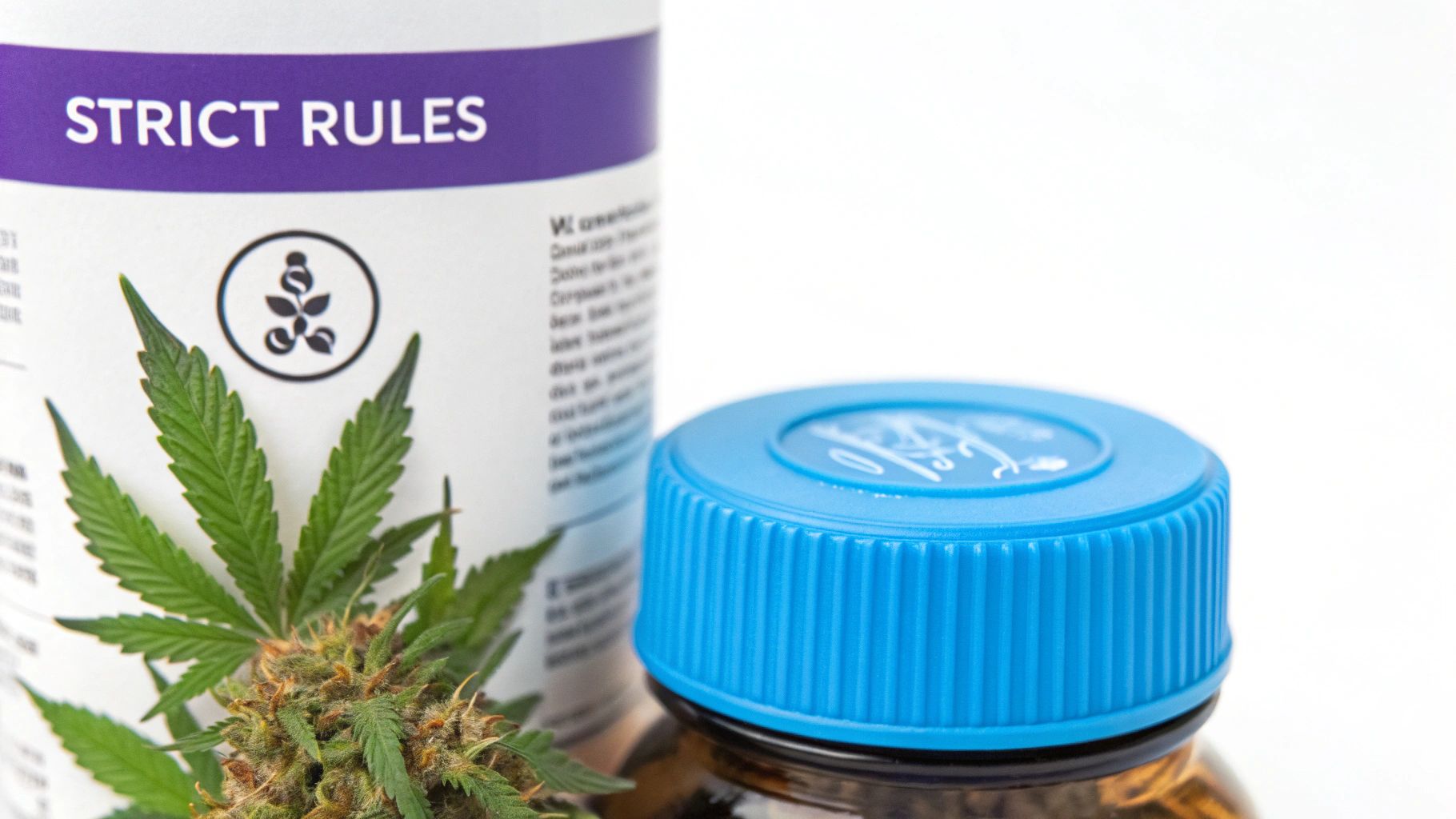
If you're shipping hemp products into Virginia, you need to know that federal law is just the starting line. The Commonwealth has its own unique, and much stricter, set of rules that have completely reshaped the market. These regulations create a compliance puzzle that boils down to two critical points: total THC per package and a specific CBD-to-THC ratio.
First and foremost is Virginia's hard cap on Total THC. A single package of any hemp product—whether it’s one gummy or a bottle of thirty—cannot contain more than 2 milligrams of Total THC.
That’s not a typo. It’s 2mg for the entire package, not per serving. This one rule immediately makes many popular national products illegal to ship or sell within Virginia's borders. There is, however, one narrow exception.
The 25-to-1 CBD-to-THC Ratio: Virginia's Big Hurdle
Virginia law allows a product to exceed the 2mg Total THC limit, but only if it meets a very specific requirement: the product must maintain a CBD-to-Total-THC ratio of at least 25-to-1.
In simple terms, for every milligram of THC in the product, there have to be at least 25 milligrams of CBD right alongside it.
Let's put that into perspective with a real-world example:
- The Product: A gummy containing 5mg of Total THC.
- The Math: To be legal in Virginia, that same gummy must also contain a minimum of 125mg of CBD (5mg THC x 25 = 125mg CBD).
This isn't a small tweak; it's a massive formulation challenge. Hitting that ratio forces brands to completely re-engineer their products, which changes everything from the effects and taste to the final cost. For a broader look at how different states handle this, you can learn more about general hemp shipping rules and restrictions.
These rules were set in stone in early 2025 when the U.S. Court of Appeals for the Fourth Circuit upheld Virginia's strict framework. The court’s decision affirmed both the 2mg Total THC cap and the 25:1 CBD-to-THC ratio, giving the state clear authority to regulate not just delta-9 THC but also isomers like delta-8 and delta-10. You can read more about the Fourth Circuit's ruling here.
Don't Forget the Packaging and Marketing Rules
On top of the THC limits, Virginia is also incredibly strict about how these products look. The state has implemented clear prohibitions on packaging and marketing to ensure products don't appeal to anyone under 21.
Here’s what you need to know:
- No Fun Shapes: Products cannot be shaped like humans, animals, vehicles, or fruits. Any resemblance to candy is out.
- Child-Resistant Packaging: All packaging for edible hemp products must be certified child-resistant.
- Clear Labeling is a Must: Labels have to accurately state the Total THC concentration per package and include all required warnings.
Ignoring any of these THC or packaging rules comes with serious penalties. For any business shipping to Virginia, getting this right isn't optional—it's essential for survival.
The Legal Risks of Shipping THCA to Virginia
<iframe width="100%" style="aspect-ratio: 16 / 9;" src="https://www.youtube.com/embed/3fzIBECJ23c" frameborder="0" allow="autoplay; encrypted-media" allowfullscreen></iframe>The world of cannabinoids is swimming in confusing acronyms, but THCA seems to cause the most headaches for online sellers. Short for tetrahydrocannabinolic acid, THCA is the non-intoxicating compound found in raw cannabis and hemp. It only converts to the psychoactive THC we all know when you apply heat—a process called decarboxylation.
This little bit of science is the very heart of a massive legal gray area for anyone shipping hemp products into Virginia. Federally, a raw THCA flower might test well below the 0.3% delta-9 THC limit, making it seem perfectly legal under the Farm Bill. But this is where Virginia’s much stricter rules throw a wrench in the works and create huge risks for sellers.
Virginia law doesn’t just look at the active delta-9 THC in a product. Instead, it regulates a product's potential to become intoxicating. To do this, the state enforces a "Total THC" standard, which combines the delta-9 THC content with the potential THC from THCA.
Why Virginia Is a No-Go Zone for High-THCA Flower
Imagine you have a hemp flower that tests at 0.2% delta-9 THC but has a whopping 20% THCA. From a federal perspective, it's compliant hemp. But the moment it crosses into Virginia, state law kicks in.
Under Virginia’s Total THC calculation, that product is considered illegal marijuana because its total potential THC is far, far above the legal 0.3% threshold.
This makes sending any high-THCA product into the Commonwealth an extremely risky bet. Even if your product is federally compliant, it's almost guaranteed to be illegal under Virginia law, and the consequences can be brutal.
Once a package crosses into Virginia, state law takes over. Relying on federal compliance alone is a recipe for seized shipments, lost revenue, and even potential legal trouble. The burden is entirely on the seller to know and follow the rules of the destination state.
Real-World Consequences and How to Stay Compliant
Shipping non-compliant THCA products into Virginia can lead to a host of problems. Law enforcement can—and does—intercept and seize packages, resulting in a total loss of your product and money. On top of that, carriers like USPS, FedEx, and UPS have their own internal policies and will flag or refuse to deliver packages they suspect contain illegal substances.
While shipping federally compliant THCA is complex in 2025, it becomes particularly tricky in states with tight regulations. Virginia's strict 0.3% Total THC and 2 mg Total THC per package caps mean shippers must be extremely diligent. You can find more details on this topic by exploring the legality of shipping THCA at smokymountaincbd.com.
To protect your business, you absolutely must follow these best practices for every Virginia-bound shipment:
- Always Include a COA: Every single package must contain a Certificate of Analysis (COA) from a third-party lab. This report needs to clearly show that the product’s Total THC content is compliant with Virginia's specific laws.
- Add a Notice to Law Enforcement: A simple, printed statement can make a world of difference. It should clarify that the contents are legal hemp, fully compliant with both the 2018 Farm Bill and Virginia state regulations.
- Choose Your Carrier Wisely: Stick with shipping carriers that have clear, well-defined policies for transporting hemp products. This transparency can help you avoid unexpected holds or returned packages.
Your Practical Compliance Checklist for Virginia Shipments
Knowing Virginia’s hemp laws is one thing; putting them into practice is another. To avoid the stiff penalties that come with a non-compliant shipment, you need a clear, actionable plan. This isn’t just about following rules—it’s about having a repeatable workflow for every single package you send to the Commonwealth.
Think of this checklist as your pre-flight inspection before sending any hemp product on its way. Each step is designed to catch the common mistakes that could get your shipment grounded, seized, or returned.
This infographic breaks down the core actions you need to take to stay on the right side of Virginia's laws.
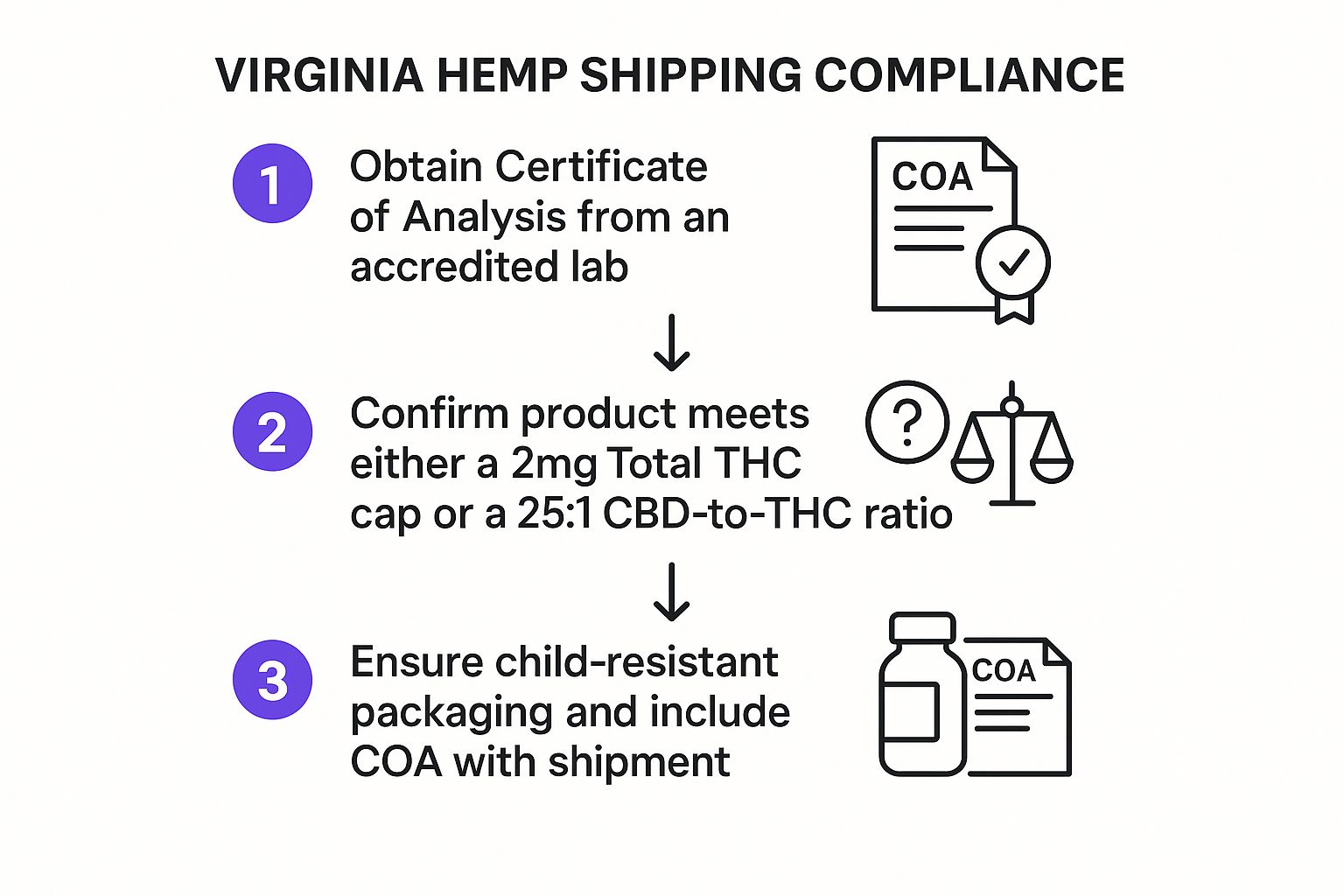
As you can see, it all boils down to three things: verifying your THC content, confirming the legal ratios, and getting your packaging and paperwork in order.
Step 1: Obtain a Comprehensive Certificate of Analysis
Before you even think about boxing up a product, you must have a valid Certificate of Analysis (COA) from an accredited, third-party lab. This document is your single most important piece of evidence, and it’s completely non-negotiable.
Here’s the critical part: the COA has to specifically test for and list the Total THC concentration. A lab report that only shows delta-9 THC isn’t good enough for Virginia’s standards and won’t protect you if your shipment gets inspected. This document is the foundation of your entire compliance strategy.
Step 2: Verify Virginia's Unique THC Limits
With your COA in hand, the next job is to double-check that your product meets Virginia's specific THC rules. This is a major trip-up for businesses who mistakenly assume that being federally legal is all that matters.
In Virginia, your product has to meet one of these two conditions:
- The 2mg Cap: The entire package must contain 2 milligrams or less of Total THC.
- The 25:1 Ratio: If the package contains more than 2mg of Total THC, the product must maintain a CBD-to-Total-THC ratio of at least 25-to-1.
If you can’t check one of those boxes, your product is considered illegal in Virginia, no matter what its federal status is.
Step 3: Prepare Your Packaging and Documentation
Finally, your packaging has to do more than just protect the product inside. It needs to meet strict safety and labeling rules designed to show regulators you’re operating above board.
Your shipment is a direct reflection of your brand's commitment to safety and the law. Including all the right documents and using compliant packaging tells regulators and carriers that you take Virginia's rules seriously.
Make sure your shipment includes the following:
- Child-Resistant Design: Any edible hemp products have to be in packaging that is officially certified as child-resistant.
- Neutral Graphics: Steer clear of any cartoons, bright designs, or shapes (like animals or fruits) that could be seen as appealing to kids.
- Include Key Documents: Always, always put a physical copy of the COA inside the shipment. It’s also a smart move to include a printed notice for law enforcement and shipping staff, clearly stating that the contents are legal hemp compliant with both federal and state law.
Trying to manage these rules for every single order can become a huge time sink, which is why automation is key for online stores. For instance, businesses using WooCommerce can get some great ideas on managing CBD and hemp shipping restrictions in our guide. Following this checklist turns a confusing legal mess into a straightforward, manageable process.
Penalties for Non-Compliance and State Enforcement
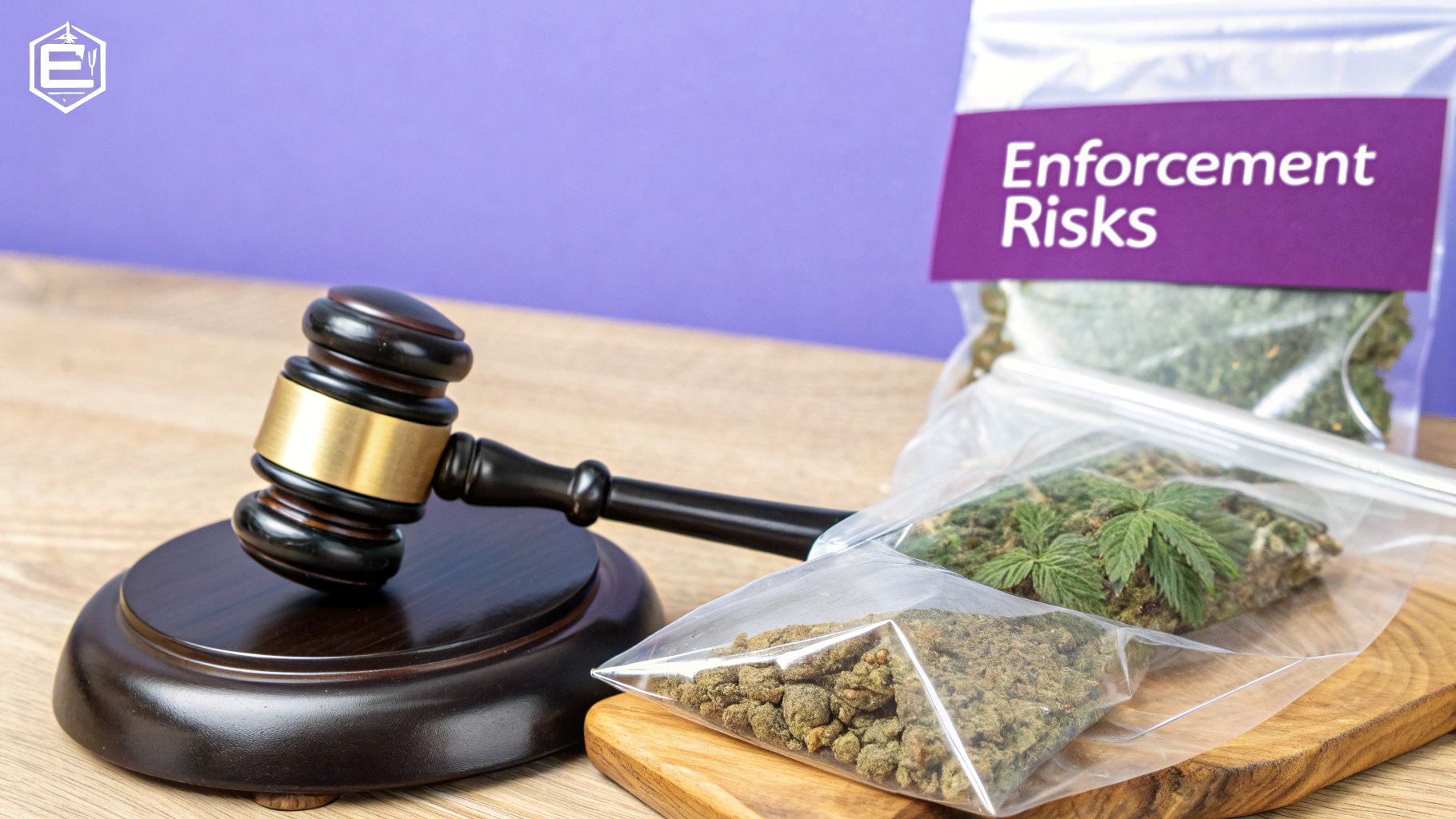
It’s one thing to understand Virginia's hemp laws, but it's another thing entirely to appreciate just how seriously the state takes them. Let's be clear: these aren't just suggestions on a government website. Virginia is actively and aggressively enforcing its rules, and the penalties for stepping out of line are severe enough to put a company out of business.
This makes navigating the CBD/Hemp/THCA shipping laws in Virginia a high-stakes game where you can't afford to get it wrong.
The main player here is the Virginia Department of Agriculture and Consumer Services (VDACS). Since launching a major crackdown in mid-2023, VDACS agents have been fanning out across the state, conducting widespread inspections of retail stores. They're meticulously scrutinizing products, checking them against the state’s strict Total THC limits and new packaging requirements.
The Real Cost of a Violation
The findings from these inspections have been eye-opening. A shocking number of businesses—some reports put the figure at over 80%—were caught with non-compliant products on their shelves. And we're not talking about a simple slap on the wrist. These violations come with tangible, costly consequences that can absolutely cripple a business.
If you're caught breaking Virginia's hemp laws, you could be looking at:
- Civil Penalties: Fines can soar up to $10,000 per violation. Keep in mind, a single non-compliant product can trigger multiple violations, so those numbers add up fast.
- Product Seizures: VDACS has the full authority to seize and destroy any product that doesn't meet state standards. That means a complete loss of your inventory and the revenue it represents.
- Injunctions: The state can go to court and get an order to shut you down completely, preventing you from selling any hemp products at all.
In Virginia's current regulatory climate, compliance isn't just a best practice—it's a fundamental requirement for survival. The financial risks tied to a single misstep are simply too big to ignore.
This aggressive enforcement posture means every single package you ship into Virginia needs to be double- and triple-checked against state law. A casual, "good enough" approach to compliance is a one-way ticket to massive fines and confiscated inventory. Adhering to the rules isn't just paperwork; it's an essential part of your business strategy.
Frequently Asked Questions About Virginia Hemp Shipping
Let's face it, digging through Virginia's hemp regulations can get confusing fast. We get a lot of questions about the specifics, so here are some straight-up answers to the most common ones about shipping CBD, Hemp, and THCA in Virginia.
Can I Ship Delta-8 THC Products to Virginia?
It’s a huge gamble, and the short answer is no. Virginia law lumps intoxicating isomers like Delta-8 right into its “Total THC” calculation.
That means any Delta-8 product has to meet the same strict limits as everything else: either the tiny 2mg Total THC cap or the 25:1 CBD-to-THC ratio. Good luck finding a standard Delta-8 gummy or vape cart that comes anywhere close to that. It’s pretty much a non-starter.
What Should I Do If My Legal Hemp Package Is Seized?
First, don't panic. If you're certain the package was compliant, the key is to have all your paperwork ready to go. You'll need the third-party lab COA proving it meets Virginia law, a copy of the 2018 Farm Bill, and a notice to law enforcement explaining the situation.
Contact the shipping carrier right away and provide them with all this evidence. Be warned, though—getting your package back isn't guaranteed. There’s still a ton of confusion out there, and carriers can be overly cautious.
While law enforcement is mostly focused on sellers, consumers aren't entirely off the hook. If you're caught with a hemp product that blows past Virginia's THC limits, it could legally be reclassified from "hemp" to "marijuana." Your safest bet is to only buy from reputable brands that can prove their products are compliant.
Do These Laws Apply to Topical CBD Products?
Technically, yes. The law is written broadly to cover all "hemp products," which includes topicals like creams and salves.
In practice, however, enforcement has almost exclusively targeted ingestible products—the stuff people eat or smoke. Topicals are under far less scrutiny. But to be 100% by the book, even a CBD lotion should stick to the state's THC limits. It's always better to be safe than sorry.
Trying to keep up with these complex, state-by-state shipping rules by hand is a recipe for headaches and lost revenue. Ship Restrict automates your compliance, letting you build precise restriction rules for WooCommerce so you never have to worry about making a costly shipping mistake again. See how Ship Restrict can protect your business.

Cody Yurk
Founder and Lead Developer of ShipRestrict, helping e-commerce businesses navigate complex shipping regulations for regulated products. Ecommerce store owner turned developer.